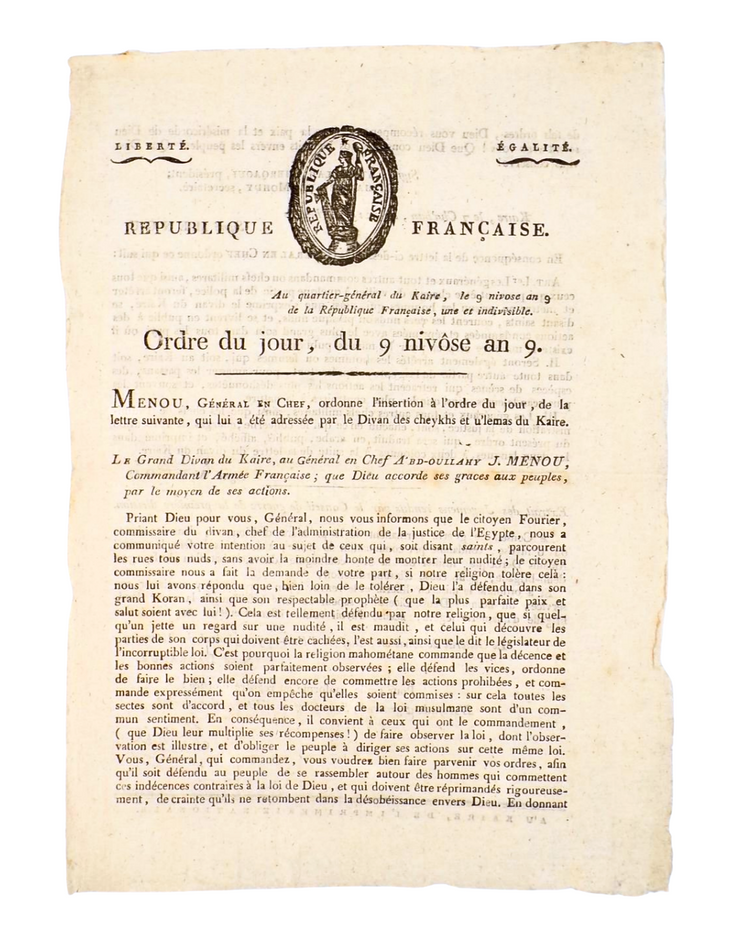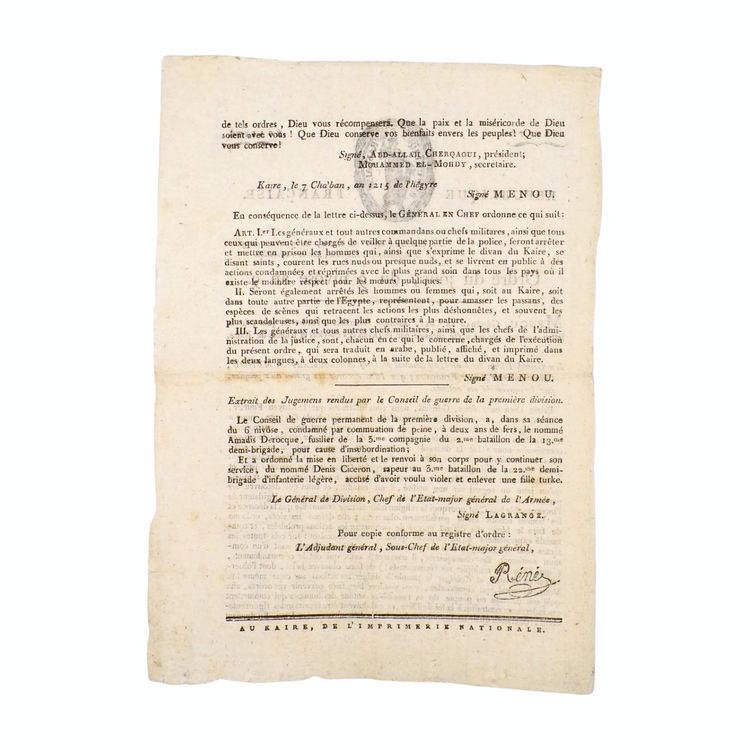“Arrest and imprison men and women who, according to the Divan of Cairo, falsely claim to be saints, wander the streets either fully or partially naked”
- Regular price
- €5.500,00 EUR
- Regular price
-
- Sale price
- €5.500,00 EUR
- Unit price
- per
Abdullah (Jacques-François de Boussay de) Menou (1750-1810).
Au quartier-général du Kaire, le 9 nivose an 9 de la République Française, une et indivisible. Ordre du jour, du 9 nivôse an 9.
Au Kaire [Gizah], de l’Imprimerie nationale, [December 30, 1800].
Folio, 2 pp. With woodcut device on title and woodcut signature at the end.
This unrecorded Ordre du jour (daily orders), printed in Cairo, serves as a vivid example of the cultural clash during the French occupation of Egypt. The document outlines the orders and regulations issued by General Menou in response to a complaint from the Divan of Cairo concerning the public behavior of French individuals, emphasizing the need for respect toward local customs and religious practices. Notably, it sheds rare light on the role of women in this brief colonial society. Reflecting the tensions and cultural conflicts of the time, these orders highlight Menou's efforts to maintain order and adhere to Islamic laws within the occupied territory. This extremely rare document, of which no other copies have been found, underscores a significant shift in the final phase of French rule toward greater respect and accommodation of local customs and traditions.
The document mentions two articles and one specific case:
- Article I decrees that generals, commanders, military chiefs, and any officials responsible for law enforcement must arrest and imprison men and women who, according to the Divan of Cairo, falsely claim to be saints, wander the streets either fully or partially naked, and engage in public actions that are explicitly condemned by the law. These individuals will be judged according to the standards of any society that upholds public morals.
- Article II states that both men and women, whether in Cairo or elsewhere in Egypt, who perform acts—often for money—that depict immoral, scandalous, or unnatural behavior will also be arrested.
Additionally, the document orders the release of Denis Cicéron, a sapper in the 2nd battalion of the 13th light infantry demi-brigade, who was accused of attempting to violate and abduct a Turkish girl.
The document is signed by Divan President Abd-Allah Cherqaoui and Secretary Mohammed el-Mohdy, dated 7 Cha’ban, 1215, in the Hijri calendar, and also bears the woodcut signature of Adjutant General René.
After the assassination of Kléber in June 1800, Jacques-François "Abdallah" Menou assumed command of the French forces in Egypt, adopting a distinct approach to the Egyptian people. He was intent to integrate with Egyptian culture, by converting to Islam, adopting the name Abdullah and marrying an Egyptian woman, Sitti Zobeida, who was said to be a descendant of Mohammed. Unlike his predecessor, who treated Egypt as an occupied territory, Menou had colonial ambitions, even considering granting French citizenship to Egyptians. His leadership was contentious, particularly after the Battle of Canope, where his decisions were criticized, leading to internal strife among his officers. Despite his efforts to maintain control, Menou ultimately surrendered to the British in 1801, marking the end of the French campaign in Egypt and his return to France.
Copies: no recorded copies found.
Condition: untrimmed, old fold with minor browning, otherwise in very good condition.
Couldn't load pickup availability
Share


Contact
Email: hugo@artemrarebooks.com
Phone: +31651042297
Visit us on appointment at:
Former US Embassy
Lange Voorhout 102
2514EJ
The Hague (The Netherlands)
Shipping address:
Nannie van Wehlstraat 51
2548MN
The Hague
The Netherlands


